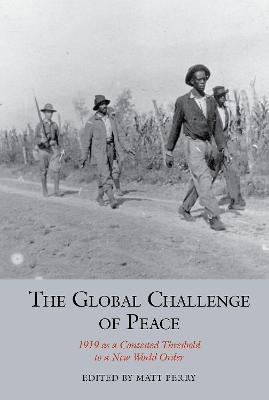
The Global Challenge of Peace
Liverpool University Press (Verlag)
978-1-80085-719-3 (ISBN)
This book scrutinizes the events of 1919 from below: the global underside of the Wilsonian moment. During 1919 the Great Powers redrew the map of the world with the Treaties of Paris and established the League of Nations intending to prevent future war. Yet what is often missed is that 1919 was a complex threshold between war and peace contested on a global scale. This process began prior to war’s end with mutinies, labour and consumer unrest, colonial revolt but reached a high point in 1919. Most obviously, the Russian Revolutions of 1917 continued into 1919 which signalled a decisive year for the Bolshevik regime. While the leaders of the Great Powers famously drew up new states in their Parisian hotel rooms, state formation also had a popular dynamic. The Irish Republic was declared. Afghanistan gained independence. Labour unrest was widespread. This year witnessed the emergence of anti-colonial insurgency and movements across Europe’s colonies; in metropolitan centres of Empire, race riots took place in the UK and during the ‘red summer’ in the US, anti-colonial movements, as well as an important moment of political enfranchisement for women but their expulsion from the wartime labour force. 1919 has many legacies: the first Arab spring, with the awakening of nationalism in the Wilsonian and Bolshevik context; the moment (as a consequence of Jallianwala Bagh) that Britain definitively lost its moral claim to India; the definitive announcement of Black presence in the UK; the great reversal of women’s participation in the skilled occupations; the first Fascist movement was founded.
Matt Perry is Reader in Labour History, Newcastle University.
Introduction: Matt PerryPart I: Race, labour and empire
Chapter 1: The Black and the Red: the Elaine, Arkansas Massacre of 1919. Tyler Stovall
Chapter 2: Within and beyond Red Clydeside: co-existing labour movements and racial hostilities in 1919. Paul Griffin
Chapter 3: The 1919 mutinies in the French Armed Forces: Colonialism, Ethnicity and the Remaking of the French left. Matt Perry
Chapter 4: 'C.L.R. James, the mass strike of 1919 in colonial Trinidad and "The Case for West Indian Self-Government"'. Christian HogsbjergPart II: Transnationalism Women’s activism in 1919
Chapter 5: Sylvia Pankhurst in 1919: Feminism, communism, and Interwar Internationalism. Neelam Srivastava
Chapter 6: Women as Peacemakers: The Women’s International League for Peace and Freedom in Zurich, 1919. Sarah Hellawell
Chapter 7: 1919: opportunities and constraints for women activists; a case study of Marie-Louise Puech and Hannah Sheehy Skeffington. Máire CrossPart III: Revolution and Counter-revolution
Chapter 8: The Forward March of Reactionary Working-Class Politics? Democratic Authoritarianism and “Modernity” in Britain and Ireland, 1919. Christopher Loughlin
Chapter 9: 1919: Revolution in Austria. Tim Kirk
Chapter 10: The “Soviet Ark” in Context: The Buford and the Anti-Radicalism of 1919. Jeffrey Johnson and Daniel RooneyPart IV: Contested Transitions to Peace
Chapter 11: Soldiers, Veterans and Volunteers for Gabriele D’Annunzio’s occupation of Fiume. Megan Trudell
Chapter 12: How did military/civilian dynamics shape adult education in Britain with the soldiers’ return and demobilisation? Jude Murphy and Nigel Todd
Chapter 13: British Military Missions as Intermediaries between Western Europe and Lithuania in 1919-1920s. Estela RuksenienePart V: Reinterpretations of 1919
Chapter 14: The General Strike of July 1919: Lenin, Wilson and their Influences on Italian Socialism. Jacopo Perazzoli
Chapter 15: The German Revolution at War’s End: Whose Revolution? Anthony McElligott
| Erscheinungsdatum | 05.10.2021 |
|---|---|
| Reihe/Serie | Studies in Labour History ; 17 |
| Verlagsort | Liverpool |
| Sprache | englisch |
| Maße | 163 x 239 mm |
| Themenwelt | Geschichte ► Teilgebiete der Geschichte ► Wirtschaftsgeschichte |
| ISBN-10 | 1-80085-719-5 / 1800857195 |
| ISBN-13 | 978-1-80085-719-3 / 9781800857193 |
| Zustand | Neuware |
| Haben Sie eine Frage zum Produkt? |
aus dem Bereich


